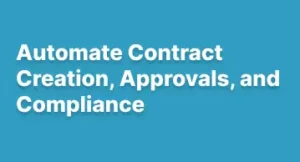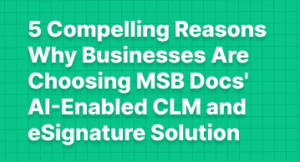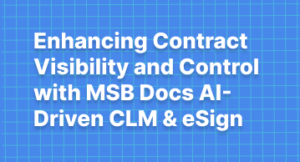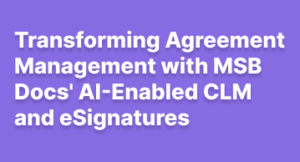Unlocking Smarter Agreements: How AI is Transforming Contracts
Introduction to AI-enabled Intelligent Agreements
Artificial Intelligence (AI) has revolutionized the way businesses work. It can boost efficiency through automation, reduce costs, and improve customer experiences. And now, as technology advances, AI is making its way into the contracts process.
Businesses that use AI-enabled intelligent agreements (AI agreements) are able to thrive in a world that moves increasingly faster. The simpler and more efficient the contract process, the better for business. AI agreements streamline the process from start to finish, providing businesses with a competitive advantage.
This guide will explain what AI-enabled agreements are, discuss the benefits of using AI in the contract process, and explore the potential AI has to revolutionize how contracts are formed, negotiated, and automated. We will also explore the ethical implications and challenges of implementing AI into the contracts process and provide examples of questions to ask when assessing AI enabled contracts. Lastly, this guide will provide an overview of the most important topics discussed.
What are AI-enabled Intelligent Agreements?
AI-enabled Intelligent Agreements are agreements that leverage the power of Artificial Intelligence (AI) to create, manage, and analyze contracts. These agreements are used to accelerate the contract process while providing richer insights and data analysis than traditional paperwork. This type of technology is increasingly being used by companies to not only automate contracts but to save on time and money spent on contract negotiation and disputes.
Using AI-enabled Intelligent Agreements, businesses can automate contract formation, plan smarter negotiation strategies, and create sophisticated automated legal models that predict outcomes and assess risks. AI can also help businesses interpret the intent and enforceability of contracts, ultimately making them more efficient and accurate. Moreover, AI-enabled Intelligent Agreements are less prone to errors by automating tedious tasks and providing tailored, more comprehensive solutions for each contract.
AI-enabled Intelligent Agreements are quickly gaining traction as an indispensable tool in contract management. They have a variety of applications from creating and negotiating contracts to interpreting data from massive legal documents. In addition, companies can use AI to automate forgotten tasks such as contract renewals, budgets, or invoices.
Overall, AI-enabled Intelligent Agreements are capable of speeding up the entire contract cycle from drafting to signing, inputting data into databases, and even digesting large amounts of information in a fraction of the time it would take humans to do so.
Benefits of Using AI in Contract Process
The use of AI in contract process has a number of advantages for businesses. AI is capable of significantly reducing the time it takes to finalise and execute contracts, as well as manage their ongoing compliance and performance. Additionally, AI can enable a more accurate identification of contractual risks, provide a better understanding of current and future market trends, and reduce the risk of human error and misjudgement. As such, utilising AI-enabled intelligent agreements can bring a variety of beneficial outcomes for businesses.
AI-enabled intelligent agreements can also improve the speed of negotiation within a business. By helping to identify potentially favourable terms for both parties, AI technology can make negotiations much faster and easier. Additionally, AI-enabled intelligent agreements can help to ensure the accuracy of the contracts, as they are reviewed multiple times by the AI system before being submitted for approval. This reduces the risk of errors or omissions that can lead to costly disputes between parties in the future.
Furthermore, AI-enabled contracts are more efficient, as they eliminate the need for manual review and contract re-drafting. By automating certain processes, businesses can streamline the contract process and minimize the amount of time spent on contract review and negotiation. Finally, AI technology can be used to quickly review contracts for potential risks or areas of non-compliance, making it easier to identify any issues and prevent disputes.
In summary, the benefits of using AI in contract processes are significant. AI-enabled contracts are more accurate, faster to negotiate, and cost-effective for businesses. Additionally, AI can help to identify potential risks quickly, allowing them to be addressed sooner, and preventing costly disputes in the future.
Discussion of AI’s Impact on Contract Formation, Negotiation and Automation
Artificial Intelligence (AI) is rapidly becoming a part of our lives, transforming many aspects of business and everyday life. AI has the potential to streamline contract negotiations and formation, providing businesses with greater efficiency and accuracy when entering into agreements. This section will discuss the impact that AI can have on contract formation, negotiation, and automation.
One of the most immediate effects of AI in contracts is its ability to streamline and automate the contract formation process. AI-enabled technologies can analyze large sets of data quickly and accurately, presenting stakeholders with timely insights into key contract provisions. This, in turn, can speed up the time it takes to enter into an agreement, as well as reducing the risk of errors or omissions in contracts. Additionally, AI tools can assist in the negotiation process by providing automated contract analyses that can identify discrepancies between versions of a contract.
AI can also be used to automate the analysis of contracts in order to ensure compliance with relevant laws and regulations. By using AI-based analytical tools, companies can quickly understand the implications of contract clauses and compare them to legal requirements. This reduces the need for manual contract reviews and significantly speeds up the process of negotiating and entering into agreements.
Moreover, AI can be utilized to automate certain aspects of contract management, such as tracking contract expiration dates and ensuring compliance with payment terms. AI-enabled tools are able to scan and analyze contracts for various clauses and key phrases and provide reports on the contractual details needed for compliance and risk management. This can help companies save on labor costs and reduce the time needed to manage contracts.
In addition, AI can potentially be used in contract interpretation and dispute resolution. AI-based systems can help decision makers gain a more detailed understanding of contracts and their implications, enabling them to identify potential areas of dispute or misinterpretation. This can help businesses better anticipate and mitigate risks associated with contracts.
AI’s potential in contract interpretation and dispute resolution
Artificial Intelligence (AI) can benefit contract interpretation and dispute resolution by helping to reduce the agreement process from a manual process to a faster, automated one. AI can be used to interpret contracts to detect any potential ambiguities or inconsistencies that could lead to disputes in the future. Furthermore, AI powered tools can help to identify and resolve disputes quickly and accurately. This is done by automatically analyzing contracts and recognizing patterns and trends between different agreements.
AI-enabled contract analysis can also streamline the drafting and review process, notifying users when there is a potential conflict between new and existing contracts. This can allow companies to prevent potential disputes and ensure that contracts provide clear remedies for both parties.
AI can also be used to provide predictive analysis of potential disputes, predicting which contract clauses are likely to trigger disputes. This is useful for helping companies select the most appropriate course of action in the event of a dispute. Some AI solutions can even be used to suggest alternative solutions that may help to resolve the dispute. Additionally, AI-powered dispute resolution services can help to automate the dispute resolution process.
Finally, AI-enabled intelligent agreements can help to improve contract compliance. Companies can use AI to monitor contract performance and identify any discrepancies between the contractual terms and the actual implementation of the agreement. This helps companies to ensure that their contracts are implemented correctly and on time.
In summary, AI-enabled intelligent agreements can help to streamline the contract process, minimize disputes, and improve contract compliance. The use of AI in contract formation, negotiation, interpretation, and dispute resolution is set to become increasingly important for businesses in the years to come.
AI Enabled Intelligent Agreements
Advancements in technology have enabled emerging Artificial Intelligence (AI) solutions to revolutionize the contract process. AI-enabled intelligent agreements are computer programs that are designed to augment and automate the traditional contract process, with the ultimate goal of simplifying and streamlining the negotiation and drafting of contracts.
With AI-driven intelligent agreements, a range of tasks can be automated such as document preparation, contract review, and the enforcement and completion of a contract. This technology can also assist with faster negotiations and faster execution of contracts, eliminating manual formatting and reducing the need for costly administrative steps.
The use of AI enabled intelligent agreements provides a wide array of benefits for companies, which include savings in time, money, and resources when drafting, negotiating and enforcing agreements. Furthermore, the use of AI can result in improved accuracy, increased transparency, and increased efficiency in the contract process.
The incorporation of AI into the contract process can provide a great degree of flexibility and scalability. Companies have the option of customizing the AI-driven intelligent agreement software to their specific needs, and can scale up or down depending on their business needs. Additionally, by using AI, companies can reduce their risk of human error, and ensure all contractual obligations are met and documented accurately.
The implementation of AI-driven intelligent agreements can be achieved in a number of ways. Companies can choose to use existing AI-enabled contract solutions, hire a vendor to build custom software for them, or leverage open source solutions provided by third-party companies. As companies begin to explore the potential of AI-enabled intelligent agreements, it is important to assess the capabilities of each solution, evaluate the cost associated with each option, and decide which is best suited to meet their needs.
Conclusions and Benefits of Implementing AI
AI-enabled intelligent agreements are gaining popularity in the business world, and are providing clear benefits. By leveraging AI to automate contract processes, organizations can reduce time and costs while still ensuring they receive quality results. AI is not just an automated system, it can also be used to provide insights into trade relations, by highlighting trends or identifying potential contractual issues. In addition, AI helps to reduce risk in the contracting process by offering quick decisions that are programmed to follow established rules.
The use of AI in the contract process can also increase trust between parties. This is important for long-term collaborations, as AI takes over a majority of the manual work, allowing both parties to focus on other tasks. By using AI, companies can also develop better customer relationships, as contracts are likely to be more reliable and tailored to customers’ needs.
In conclusion, using AI in the contract process provides numerous benefits, from increased accuracy to improved efficiency. AI allows both parties to enjoy a faster and more accurate agreement formation process, freeing up resources and reducing costs.
Examples of Questions to Ask When Assessing AI-enabled Contracts
When assessing AI-enabled contracts, it is important to ask pertinent questions. The following are some of the key issues to consider when evaluating whether AI-enabled contracts are right for you:
- What are the potential legal implications?
- How would the AI-enabled contract process differ from a traditional contract negotiation process?
- What tech challenges might be present in the implementation of AI contracts?
- Are there risks that could arise from using AI in the contract process?
- How will AI-enabled contracts affect the customer experience?
- Is the AI-enabled contract system secure?
- Are there ethical issues associated with using AI-enabled contracts?
- What safeguards are in place to ensure accuracy in the contract process?
- What data and analytics are available to measure the success of the AI-enabled contract process?
- How quickly can the AI-enabled contract process be implemented?
These questions will help guide you in making an informed decision on whether AI-enabled contracts are suitable for your organization’s goals.
What are the Ethical Implications and Challenges in Implementing AI into Contract Processes?
Artificial Intelligence (AI) has the potential to revolutionize contract processes, from drafting to disputes resolution. This innovation comes with several ethical implications and challenges that need to be understood by organizations considering the use of AI.
The primary ethical issue is trust. People must trust that the AI and its algorithms will not be manipulating data for malicious or unethical purposes. Organizations need to ensure their AI systems are secure, transparent, and compliant with privacy regulations. If companies fail to provide assurance that their AI systems are reliable and trustworthy, this could lead to major legal issues and reputational damage.
Secondly, using AI in contracts has implications for the concept of legal obligation. AI techniques can automate complex legal clauses that a person may not fully understand, leading to uncertainty about whether a contract would still be legally binding. Companies should be aware of the legal obligations underpinning existing contracts and carefully consider the ethical implications of allowing AI to automate any part of the process.
Finally, an important ethical question is who is responsible for any mistakes made due to AI-enabled contract processes? It must be clear who is accountable if an AI system makes errors that cause harm or losses. Companies must have robust processes in place to monitor the performance of AI in contracts, as well as procedures for addressing any mistakes.
In summary, implementing AI into the contracts process comes with a range of ethical implications and challenges. Companies must take these into account when weighing up the pros and cons of AI-enabled contracts.
Summary
AI-enabled Intelligent Agreements are transforming how businesses manage and process contracts. Artificial Intelligence has allowed for faster, smarter, and more accurate contract creation, negotiation, automation, interpretation, and dispute resolution. Companies that utilize AI in their contracts processes can expect to experience the benefits of improved accuracy, expediency, access to new resources, cost savings, and increased security.
The ethical considerations surrounding the use of AI must always be taken into account, as well as the challenges associated with implementing AI into the contracts process. While it’s important to be aware of these questions, AI-enabled Intelligent Agreement technology has proven itself to be a powerful asset to any business looking to improve its contracts processes.
Endnotes and References are an important part of any document, including intelligent agreements enabled by Artificial Intelligence (AI). The endnotes provide a source of information that helps to back up any claims made in the document. The references provide an easy way for readers to locate factual information quickly, such as links to websites or other sources of information.
In the case of AI-enabled contracts, endnotes and references are particularly important. As AI-enabled processes become more sophisticated and complex, it is important to make sure that all claims made in the document are accurately backed up by reliable sources. Endnotes provide a way for readers to quickly see where the claims were sourced from, giving them confidence in the accuracy of the document’s content.
References to other sources can also be helpful in understanding the concept of AI-enabled contracts. While AI technology is rapidly changing, having references to other sources such as articles, research papers, or videos can help readers stay up-to-date on the technology’s progress and to better understand the implications of the technology.
Having endnotes and references included in a document on AI-enabled contracts can also help build trust with readers of the document. Having back-up information helps establish credibility and offers assurance that the claims made are accurate. Endnotes and references also allow readers to go back and double check any information or claims in the document. This helps to establish trust between the author and the reader.
Including endnotes and references in any document on AI-enabled contracts is essential for an accurate, well-rounded guide. Such references are important for building trust with the readers and offering evidence to back up any claims made within the document.
Conclusion: Summarizing the Most Important Topics Discussed
We have discussed the importance of AI-enabled intelligent agreements, and explored in depth the ways in which this new technology can help streamline and improve the contracting process. We discussed what AI-enabled agreements are, the benefits to using AI in contract processes, how AI has and will continue to impact contract formation, negotiation, and automation. We also discussed potential uses of AI in contract interpretation and dispute resolution, how companies can implement AI into their contract processes, the ethical implications and challenges in implementing AI, and ways in which AI can help with contract compliance.
AI-enabled intelligent agreements provide a unique opportunity to streamline the contract process while providing additional insight and cost benefits over traditional agreements. By using AI during the contract drafting process, companies can reduce costs associated with contracting and minimize the risk associated with contract interpretation. Additionally, AI-enabled agreements enable enhanced performance monitoring, allowing businesses to monitor a contract’s effectiveness throughout its lifecycle and quickly identify areas for improvement.
As we look towards the future of contracting, AI-enabled contracts will provide unprecedented opportunities for companies to create agreements that are more effective, tailored to specific business needs and requirements, and most importantly, intelligent.
FAQs about AI-Enabled Intelligent Agreements
1. What is AI-enabled Intelligent Agreements?
AI-enabled intelligent agreements are computerized contracts that use algorithms and machine learning to create and negotiate contracts. This technology can enable companies to more efficiently draft, negotiate, and manage their contracts.
2. What are the benefits to using AI in the contract process?
With AI-enabled intelligent agreements, companies have the ability to greatly reduce negotiation time by using data-driven AutoML workloads to generate and negotiate contracts in a fraction of the time that it would take with manual processes. AI-enabled agreements can also automate repetitive tasks like document review and offer an improved audit trail for contract activities.
3. How does AI impact contract formation, negotiation, and automation?
AI can help automate and streamline contract formation, negotiation, and automation, enabling organizations to more efficiently create, review, and execute contracts. By providing a more accurate assessment of contract terms and clauses, AI enables intelligent agreements that serve as a core tool for contract negotiation and automation.
4. What are the potential benefits of AI in contract interpretation and dispute resolution?
AI-enabled intelligent agreements can provide legal teams with an unprecedented level of access to information related to contracts, and help facilitate faster dispute resolution. By leveraging data-driven insights, AI-enabled agreements can help legal teams make more accurate decisions when interpreting and resolving disputes.
5. What steps should companies take to implement AI into their contract processes?
Companies should start by clearly defining their objectives for using AI-enabled contracts and establishing a roadmap for how they plan to achieve these objectives. It is also important for companies to select the right AI tools and platforms for implementing AI in their contract processes, and ensure their teams have the necessary training and support to effectively use the technology.
6. What are the ethical implications and challenges of implementing AI into the contracts process?
To ensure ethical use of AI-enabled intelligent contracts, companies must be aware of potential risks associated with using automated systems to manage contracts. Companies must consider how AI systems will impact the privacy of parties involved, and if the data used has been collected ethically. Companies must also weigh the potential risks associated with automated decisions being made without human oversight.
7. What are some examples of questions to ask when assessing AI enabled contracts?
Some questions to consider when assessing AI enabled contracts include: Are the contract terms automated? Does the agreement provide adequate protection to all parties involved? Who will have access to the data used to automate the contract? Are the algorithms stored securely? Is the AI system compliant with relevant regulations?





